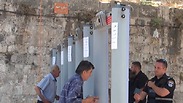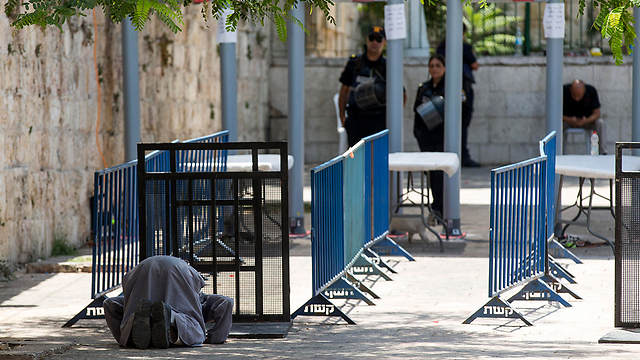
Ministers discuss smart cameras instead of metal detectors on Temple Mount
In effort to find solution to standoff at the holy site, police proposes cameras, which include thermal systems and can detect whether a person is carrying weapons or explosives, and are estimated to cost hundreds of millions of shekels.
The Security Cabinet met for a second straight day Monday to try to defuse an escalating crisis with the Muslim world and find an alternative to metal detectors that had been installed a week earlier at a contested Jerusalem shrine amid widespread protests.
Ministers were being asked to consider the installation of sophisticated, high-resolution cameras and increased police deployments as a replacement for the metal detectors.
The metal detectors were installed to increase security at the Temple Mount earlier this month after Israeli Arab terrorists opened fire from the holy site, killing two Israeli policemen.
The move incensed the Muslim world, leading to protests and violent clashes between Muslim worshipers and Israeli security forces in which four Palestinians have been killed over the past weekend.
In recent days, the Israel Police have held a series of meetings with representatives of four leading security companies in Israel and abroad in an effort to find an alternative.
Among the offered solutions are smart security cameras that include thermal systems and can detect concealed weapons or explosives as well as advanced facial recognition systems.
The installation of the smart cameras and associated systems is expensive and estimated at hundreds of millions of shekels.
In addition to the cameras, the Israel Police proposes to significantly increase its forces in Jerusalem's Old City and at the entrances to the Temple Mount.
In the interim between the removal of the metal detectors and the installation of the new cameras, the surveillance cameras installed at the entrance to the Temple Mount on Sunday will continue operating.
Jordan's King Abdullah II and Prime Minister Benjamin Netanyahu spoke by phone on Monday, with the king stressing the need to "remove the measures taken by the Israeli side since the recent crisis broke out" and to agree on steps that would prevent another escalation in the future, according to Jordan's state news agency Petra.
As part of intensifying diplomatic efforts, President Donald Trump's Mideast envoy, Jason Greenblatt, met with Netanyahu in Jerusalem on Monday and then headed to Amman to meet with Jordanian officials.
UN Security Council meets on crisis
United Nations Middle East envoy Nickolay Mladenov warned that a solution was needed by Friday to the Jerusalem mosque crisis, which he said threatens to have "potential catastrophic costs well beyond the walls of the Old City."
"The dangers on the ground will escalate if we go through another cycle of Friday prayer without a resolution," Mladenov told reporters after briefing the UN Security Council behind closed doors.
The 15-member Security Council met on the crisis at the request of Sweden, France and Egypt.
Sweden's Deputy UN Ambassador Carl Skau posted on Twitter after the meeting that Security Council members "agree on need for de-escalation, condemnation of violence and urgent dialogue to calm tensions in Jerusalem."
The Security Council is due to hold its quarterly Middle East briefing on Tuesday. Mladenov appealed to member states to "avoid further inflaming the situation" when they address the public meeting.
"We will enable everybody to come and pray on the Temple Mount, but at the same time we will do whatever is necessary to maintain security of this important site," Israel's UN Ambassador Danny Danon said ahead of the meeting.
Palestinian UN envoy Riyad Mansour told reporters: "We are against violence ... and we want the Security Council to have the political will to protect the Palestinian people against such violence from the Israeli occupying authority."
The Associated Press and Reuters contributed to this report.











